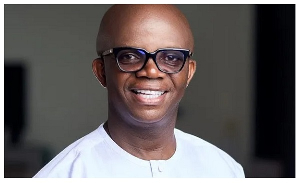The Ghana Chamber of Mines has proposed the inclusion in the current mining regime a legislation that ensures that all forms of mining are preceded with exhaustive exploration, to curb the wanton destruction, and increasing environmental pollution from widespread illegal mining activities happening in the country.
The Chief Executive of the Chamber, Sulemanu Koney, said this should be done to determine the availability of mineral deposits, and to a large extent its commercial viability, as has been the practice for large scale mining companies, before licenses and permits are granted for mining.
This, he said among others, will put a stop to ‘speculative mining’ done by some small-scale mining operators that lead to the vast destruction of lands without any proper attempt to cover and reclaim mined pits.
He also noted that government could engage the services of some the graduates of the University of Mines to supervise the work of small-scale mining companies.
As part of efforts to find a workable solution to the illegal mining menace that has resulted in a directive halting all forms of small-scale mining activities in the country, he said the Chamber is collaborating with government to develop a blueprint for a well-regulated small-scale mining sector.
To this end, Mr. Koney said the Chamber, has also requested to be part of government’s ‘Multilateral Mining Integrated Project (MMIP),’ an alternative livelihood programme for illegal miners, which is expected to improve the mining sector by tackling illegalities, as well as ensure the efficient use of revenue generated from the mining sector for economic development.
The Chief Executive of Chamber of Mines, who was speaking at an annual media engagement, in Kumasi, under the theme “Leveraging Ghana’s Mining Industry to Accelerate Development,” noted that these form part of attempts by the Chamber to help sanitize the mining industry.
Being a major contributor to the country’s fiscal collections, Mr. Koney asserted that it is time the country took advantage of the opportunities presented by the industry to advance the country’s development agenda.
For instance, the mining industry emerged the leading tax payer, and contributor to the GRA’s Domestic Collections in 2016 contributing about GHS 1.64 billion. This represents 15.8 percent of the Total Direct Taxes in 2016.
Corporate Tax from the Industry stood at GHS 696.97 million while Mineral Royalties was GHS 550.73 million and Pay as You Earn (PAYE) accounting for GHS 399.92 million.
It also accounted for 46 percent of the country’s gross export revenue in 2016, reinforcing its position as the leading source for forex and a major contributor to the country’s balance of payments.
For the first time since 2011, according to the Monitory Policy Committee (MPC) report for January 2017, the provisional balance of payments in 2016 recorded a surplus. This largely reflected an improvement in the trade balance driven by a rise in gold export receipts and a fall in oil import prices.”
Producing members of the Chamber returned USD 2.3 billion, representing 71% of their mineral revenue (USD3.2 billion) through the Bank of Ghana and the Commercial Banks in 2016. This is seen to have had a significant bearing on the international reserve position of Bank of Ghana and the stability of the monetary system as a whole.
It is against this backdrop that the Chamber maintained that the country must be positioned to identify and take advantage of the opportunities presented by the industry for broader and sustained economic development.
After mining in Ghana for over a century, the poor state of mining communities reflects badly on the image of the mining industry; a sector that contributes significantly to national development. It was suggested that the establishment of a Minerals Development Fund Act has the potential to address the developmental imbalance in host mining communities.
But many years after pushing for the establishment of the Mineral Development Fund, very little is there to show the interest of the country to make this feasible.
Business News of Friday, 8 September 2017
Source: thebftonline.com
Exploration should precede all forms of mining - Chamber of Mines advocates
Entertainment
















